Paris Trade Shows Scale Up Once More

PARIS — After several seasons of scaled-back affairs, the recent round of fashion and accessories trade shows, held here from March 4 to 7, scaled up operations once more after two years of smaller formats.
Tranoï returned to its historic Bourse venue with around 90 exhibitors and an affirmation of its new positioning fine-tuned over the past two years. “The feedback is positive, people have commented on how much Tranoï has changed,” said the fair’s president Boris Provost. “The buyers are here, and they are placing orders, they are looking for something new.”
More from WWD
“French retailers had a very strong end of year, so they are feeling more confident about buying,” said Frédéric Maus, general director of Première Classe organizer WSN Développement.

The event, which focuses mainly on accessories, hosted around 250 brands — a little more than half of the number of pre-pandemic editions — in a tent in the Tuileries gardens.
For the most part with restrictions easing in Europe and American buyers returning to Paris, many for the first time in two years, people were happy to be back — despite the war in Ukraine being front-of-mind, heightening a sense of uncertainty that many had hoped the industry could put behind it. Only Asian buyers remained largely absent, organizers said.
At Première Classe, Maus estimated mid-weekend that footfall was down by between 20 and 25 percent compared with March 2020, the last full-scale edition of the event. Traffic overall was stable compared with its October edition last year.
Only Woman was still working with a showroom-type model, featuring just 10 labels. “Our real comeback will be in June, we’re all holding out for that,” said Man/Woman director Antoine Floch.
Buyers confirmed that it was good to be back. “Despite the difficult context, everyone is feeling great to be back in Paris for physical presentations,” said La Samaritaine merchandising director for fashion and accessories Victoria Dartigues. Tranoi and Première Classe were complementary, she said. “There was no overlap in terms of the offer.”
“The way of highlighting young designers was great, because it’s been really difficult for them to develop over the past two years,” she said, highlighting the space for former Hyères finalists including Casa Remedios and Céline Shen at the center of the Première Classe show space, and adding that she had appreciated the curated offer at Tranoï.
Newcomers made up a significant proportion of exhibitors at the shows — around half of the selection at Tranoï, and roughly 60 at Première Classe.
It was not just in terms of traffic that the events had a more international profile — in terms of exhibitors, there was a marked uptick in participants from abroad. At Tranoï, there was a showcase of nine designers from Seoul Fashion Week, including a well-attended runway show where four of them showed their collections.
“Our goal is for Seoul designers to go global,” said Sam Kim, chief executive officer of Sam + Company, which organized the partnership. “K-pop, K-movies and K-beauty are global, people love our culture. We want to show that K-fashion is now ready to go global.”
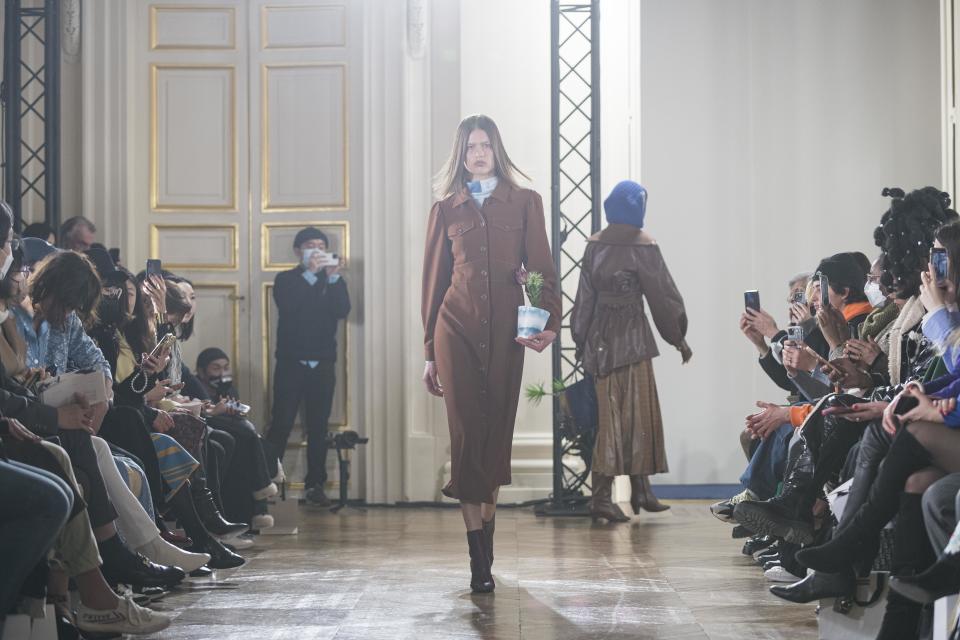
ALEXANDRE GALLOSI/Courtesy Photo
Tranoï also featured a selection of Italian designers returning for the first time since the pandemic, as well as labels from Hong Kong under the Fashion Farm Foundation, including Central Saint Martins graduate Celine Kwan, who presented her first collection of colorful 1960s-inspired designs, and Rickyy Wong Studio. There were also three labels from Georgia. Lilia Litkovskaya, one of very few Ukrainian designers who made it to Paris — without her collection — used her booth to raise awareness of the war and humanitarian crisis unfolding in her homeland, displaying a giant Ukrainian flag adorned with flowers and QR codes linking to the works and profiles of her compatriot photographers, artists and designers, as reported.
Over at Première Classe, the work of African designers was showcased in a central space thanks to WSN’s partnership with accelerator Birimian. They included Christie Brown, from Ghana; Rich Mnisi, from South Africa, and This is Us, from Nigeria. “Our role is to promote the Afropolitan lifestyle,” explained Birimian founder Laureen Kouassi-Olsson. While the designers present already generate significant business in their home markets, international distribution is key to further development, both at home and abroad, she said. “African designers need to have international success in order to appeal to consumers at home, too,” she explained.
There was also a central fine-jewelry space featuring 10 designers, Precious Room by Muriel Piaser, which would normally present a one-day event during couture.
Show organizers are counting on a full-scale return of international traffic by the fall. Provost said come September, Tranoï should be back to a full-scale edition with between 130 and 140 exhibitors occupying two floors of the historic Bourse venue. For Première Classe, plans for October involve separate tents for accessories and ready-to-wear, with the latter under a new concept. The one-tent format this season meant having to refuse a number of brands that had wanted to participate, Maus said.
Highlights From the Paris Trade Shows
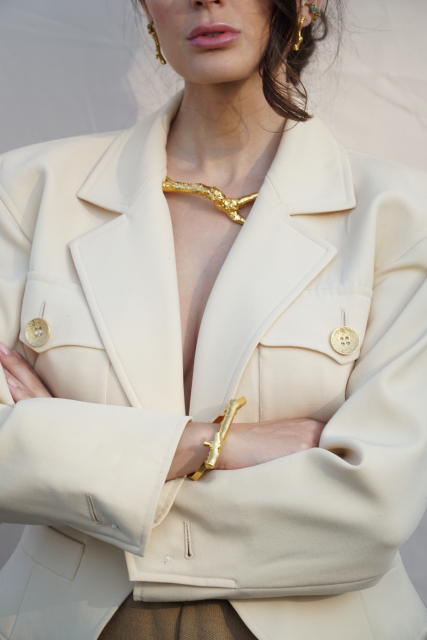
Courtesy of Casa Remedios
Casa Remedios
Showing at: Première Classe
Category: Jewelry
Former Hyères prize finalist Casa Remedios is the fruit — literally — of a collaboration between leather goods designer Serena Cancellier and Colombian jewelry designer Mercedes Salazar. Their striking jewelry pieces are made by coating real plants with precious metals known for their botanical properties. Branches of mimosa, fur fronds and orchids, for example, are turned into graphic, poetic jewelry pieces in their collection.
Pricing: 55 euros to 800 euros retail

Courtesy of Oblique
Oblique
Showing at: Première Classe
Category: Outerwear
Charles Pinel and Harry Ancely are the creative forces behind Oblique, described as a neo-futuristic outerwear label. The brand recently won the Talents de Mode Responsible Fashion Prize for its architectural, sustainably created designs. The fall collection, crafted principally from navy blue wool with recycled polyester lining, featured rounded shapes inspired by whales, with subtle details evoking the sea mammal’s ventral pleats and fins. Founded in 2020, Oblique plans to expand its register with full looks from next season.
Pricing: 700 euros to 1,000 euros retail
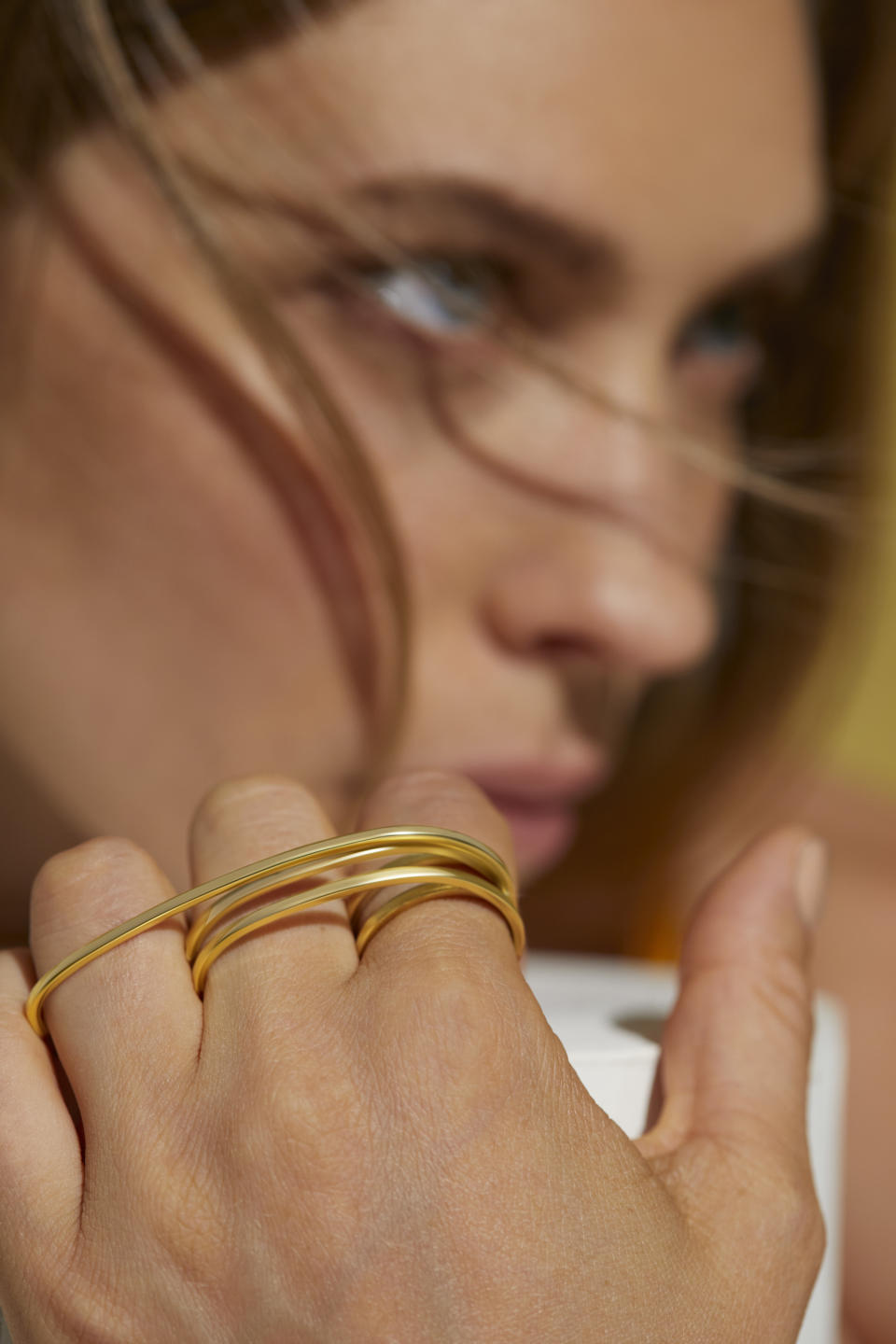
Courtesy of Ôkan Studio
Ôkan Studio
Showing at: Première Classe
Category: Jewelry
Created by former L’Oréal marketing executive Margaux Gripon — who learned her new craft thanks to YouTube videos — two years ago, Ôkan Studio offers minimalistic yet quirky, asymmetric jewelry pieces in silver, vermeil and gold-plated brass. The lineup includes rings that loop around three fingers as well as a broad range of earrings that innovatively tuck inside the ear so no piercing is necessary.
Pricing: 90 euros to 830 euros retail

Courtesy of Maïtias
Maïtias
Showing at: Première Classe/Precious Room by Muriel Piaser
Category: Jewelry
Paris-based Marie-Luce Orbiscay had a career in marketing before studying jewelry design at the École du Louvre. She decided to launch her fine jewelry brand Maïtias, which means “beloved” in the Basque language, just before COVID-19 hit. Crafted by hand using recycled or fair-trade silver and vermeil, mother-of-pearl, semiprecious stones and diamonds, her designs included deconstructed creole earrings featuring stones in the colors of the seven chakras and rings with sun or floral motifs.
Pricing: 250 euros to 700 euros wholesale

Courtesy of Le Fil Paris
Le Fil Paris
Showing at: Tranoï
Category: Ready-to-wear
Lyn Abdel Rahman, from Lebanon, and Filza Marri, from Pakistan, met while they were students at the Istituto Marangoni in Paris. While they did not intend to create their own label so soon, their project took shape when they returned home for lockdowns. Their colorful collection combines materials in unusual ways — a wide corduroy shift dress trimmed with ruffled organza sleeves was a highlight. Sustainability is a major focus for the young design duo; they use fabric scraps to cover their buttons and send offcuts to women in southern Pakistan to make patchwork quilts, providing them with an income.
Pricing: 120 euros to 1,200 euros retail
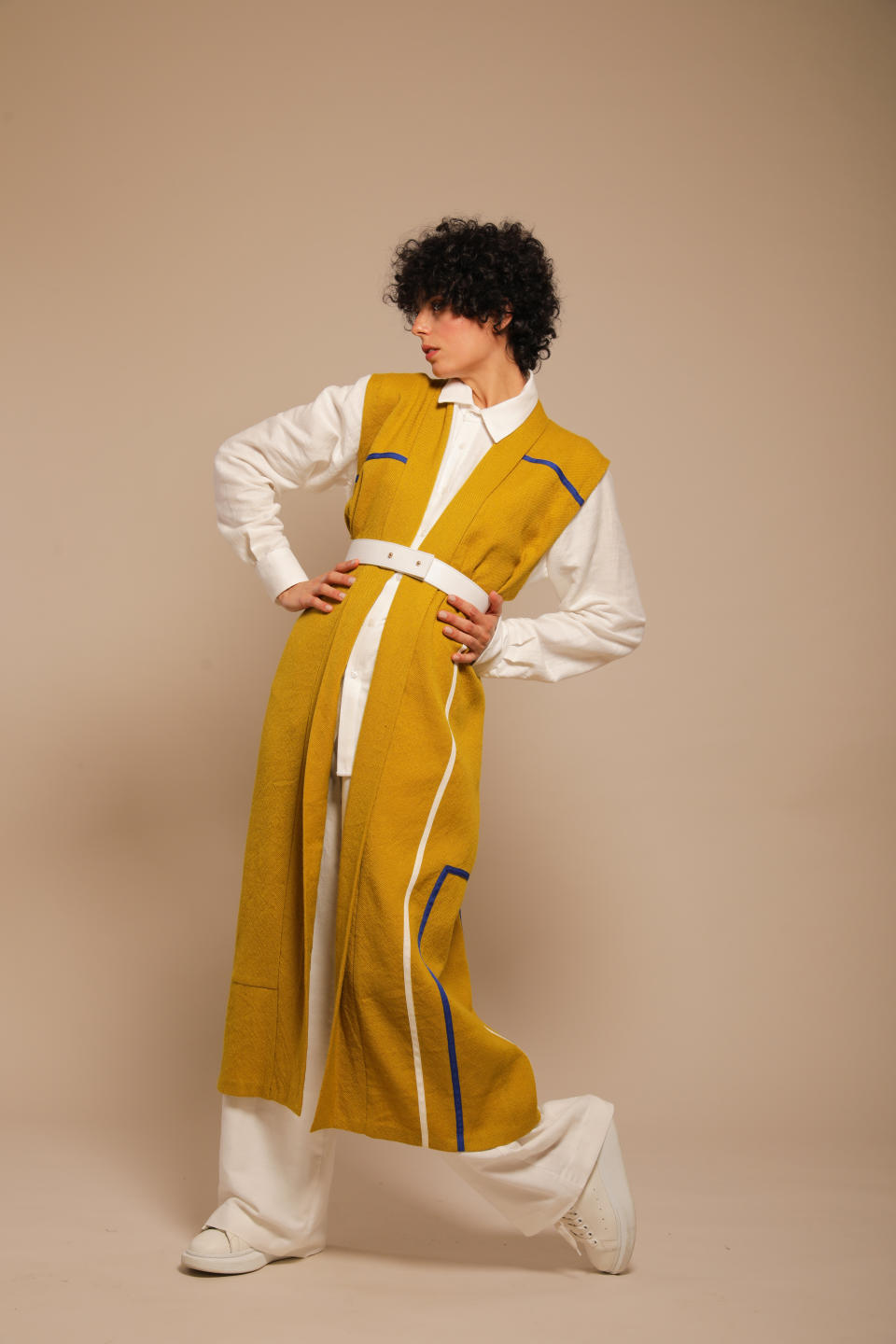
Courtesy of Lore & Heart
Lore & Heart
Showing at: Tranoï
Category: Ready-to-wear
Paris-based sisters Salma and Cyrine Ben Hamida called on their Tunisian heritage to create their rtw label, which launched in 2018. Using ancestral weaving techniques and natural fabrics like linen and wool, they build the collection around capes and outsized scarves featuring graphic binding details and practical pockets, rounding out the lineup with simple wide pants and shirts to match.
Pricing: 80 euros to 700 euros retail

Courtesy of Kapush
Kapush
Showing at: Tranoï
Category: Accessories
A psychotherapist by trade, Debora O’hana had an “aha” moment when the skies opened during an open-air concert, leading her to change her career tack and launch her range of colorful sporty hoods. Inspired by puffer jackets, but designed to be styled with anything, they are crafted with deadstock fabric from Nona Source, and feature poppers so they can be attached to a handbag strap for added practicality. Each design is only available in limited quantities.
Pricing: Starting at 400 euros retail.
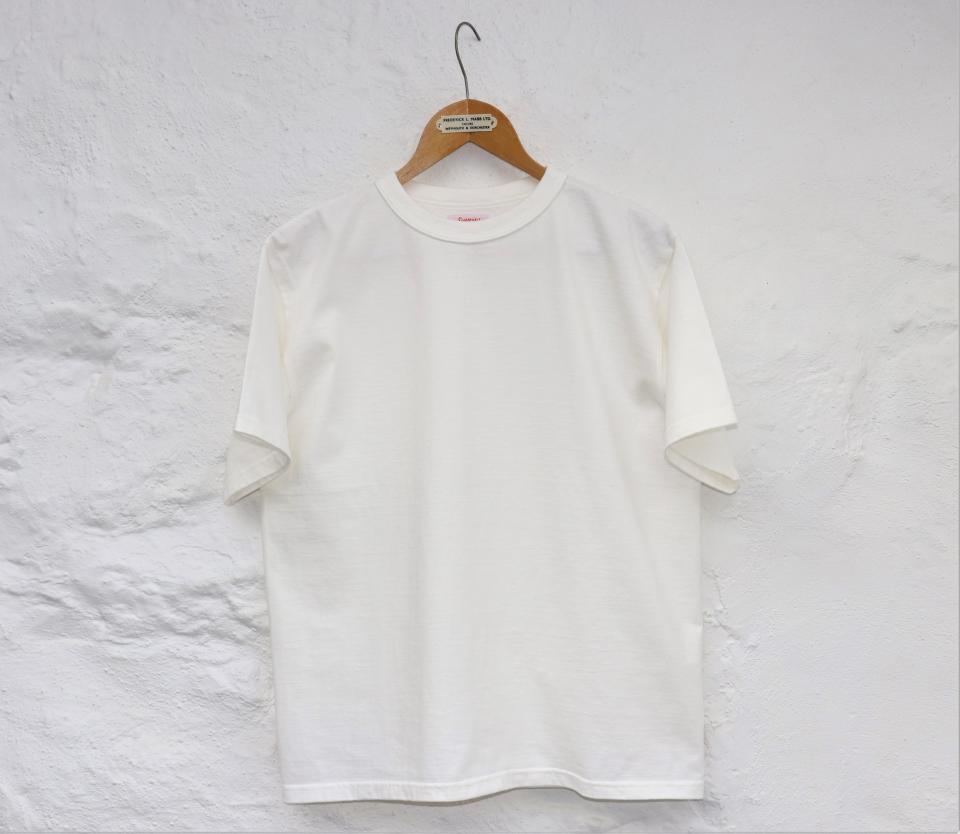
Courtesy of Sunray Sportswear
Sunray Sportswear
Showing at: Woman
Category: Ready-to-wear
U.K.-based Colin Campbell couldn’t find the perfect white T-shirt, so set out to launch his own. Working with a small factory in Osaka, Japan on vintage circular knitting machines, he sought to create products that would never shrink or go out of shape. Launched in 2020, the label has a sustainable mindset — waste cotton fluff is recycled into more jersey, labels are made from recycled polyester, and shipments are climate-neutral. The fast-growing brand has just introduced its first designs specifically for women, and also offers sweatshirts alongside a range of t-shirt designs. “Brand loyalty is phenomenal,” said Campbell, a former military physical education teacher. “I have no Instagram, no website and it creates mystery — people who want them seek out the retailers.”
Pricing: 65 pounds to 135 pounds, or $85 to $177, at retail.
Best of WWD
Sign up for WWD's Newsletter. For the latest news, follow us on Twitter, Facebook, and Instagram.

